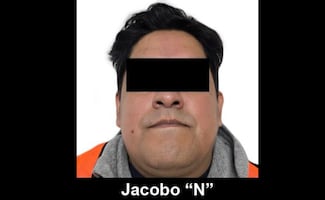Más Información

Vinculan a proceso a "El Yeicob", socio del empresario Raúl Rocha, por delincuencia organizada; le dictan prisión preventiva

Vinculan a proceso a "El Limones" por narcotráfico y posesión de armas; continúa en prisión en el Altiplano

UIF respalda sanciones de EU contra el Cártel de Santa Rosa de Lima; fortalece esfuerzos conjuntos para reducir criminalidad, destaca
It is five o'clock. Albina comes running; leaves her things next to the canopies: a backpack, necklaces, and painted clay mugs. She sits down and thus the class begins. This November afternoon she has to learn to combine the “r” with vocals. They lose no time; teacher Francisco Camacho makes a quick review of the vocals. Albina repeats them: “a, e, I, o, u.” Now come the syllables; “ra, re, ri, ro, ru.” Albina is nervous because she says she does not have good memory to remember the lessons.
That is why, she says, her dad took her out of school when she was only seven years old and sent her to the beach to sell the crafts they make in her town, San Miguel Tecuiciapan , located over River Balsas in the municipality of Tepecuacuilco , an hour away from Chilpancingo .
Albina Salgado Rivera
is Nahua; she is 52 years old and has walked through beaches and touristic centers in the country since she was a little girl.
Have you heard
?
On one of those tours, when she was 14 years old, she met her husband in Cuernavaca, Morelos . Two months later they decided to live together. They had six children; three of them died.
They decided to live in Acapulco 10 years ago. Her husband paints the crafts and Albina walks 10 km of beach everyday selling them to tourists.
Albina is a short, robust woman with long hair and dark skin . She wears what every woman wears in her town: petticoat, apron, and plastic sandals.
Almost every Monday and Wednesday in the afternoon, she stops at Magallanes beach to study. Albina is one of the students of the Beach Academy founded by Jovita Cavigelli earlier this year,
Albina wants to learn how to read and write because, she says, she is tired of asking where is the bus that takes her to her town. She also says that learning how to read and write is important for her because she would have really liked to help her children with their homework.
That afternoon, teacher Francisco gave her a grade of 8.5 . Albina learned how to spell the sentence “Ramón runs rapidly.”
Habe you heard Yalitza Aparicio is
?
Classes by the seashore
The Beach Academy is nothing else than a pair of lent canopies and chairs and three whiteboards by the seashore. Six volunteer teachers teach how to read, write, maths, English, and give back-up lessons to merchants and their children.
The classes take place every Monday and Wednesday ; there is not a set calendar. The classes depend on the students , and students depend on tourists . If the beach is full of visitors, the merchants and their children prefer to keep selling. When tourism reduces, the seats in the academy are full again, if the students do not choose to go to their towns.
Usually, nearly 15 students attend the classes, between adults, teenagers, and children. Most of them want to learn how to read and write. Almost all of them come from communities of the “La Montaña” region where poverty, marginalization, and the lack of jobs have forced them to leave looking for a source of income. And they leave everything, including their studies.
In 2018, the National Institute for the Evaluation of Education (INEE) presented a study that shows that indigenous people have thrice fewer possibilities to learn how to read and write. Guerrero is the state with the highest educational lagging in its indigenous groups: 30% of that population are illiterate.
Did you know
over 70% of indigenous people live in poverty
?
That study shows one of the reasons for the lagging: out of the 29,000 schools in that sector, only 2,000 have bilingual teachers , that is, teachers who speak native languages; in the rest of them, teachers and students do not understand each other.
In general, in Guerrero, 14 out of 100 persons older than 15 years old do not how to read nor write; twice as the national average according to the National Institute of Statistics and Geography (Inegi) .
Jovita Cavigelli
is the founder of the beach Academy. She says that she decided to open it after having contact with many merchants. She found out they did not know how to write nor read and that many times they are misled for that reason.
“That condition makes them really vulnerable and the idea is to give them tools, to train them to improve their sales and their daily life,” explains Jovita.
Did you know over
?
She was enchanted by the port
Jovita Cavigelli first arrived in Acapulco in 1997 to organize the arrival of a boat with humanitarian aid . In the meanwhile, hurricane Paulina swept the port: 200 people died, over 60,000 houses were damaged, affecting 200,000 people , according to official data.
Jovita was not indifferent; she channeled most of the aid that came in the boat to the affected. However, she was not satisfied. She met them and their suffering; she helped many of them to bury their relatives. She created help groups, training groups, and literacy groups .
It was for a short period; Jovita had to go back to Switzerland due to her job and her family. However, she created a special bond with Acapulco and it never left her mind.
After 16 years , in 2013 , Jovita came back and found tragedy once again: Hurricane Manuel and storm Ingrid afflicted Acapulco and a great part of Guerrero.
She was not indifferent this time, either: She came close to those affected. She went to the neighborhoods in the periphery to create training and literacy groups.
Have you heard of the
?
This time she decided to stay in Acapulco. The beauty of the port, its weather, its food, but mainly its people and their needs, forced her to rethink her life .
Forst, she shared her time between Switzerland and Acapulco . In the port, she visited communities and neighborhoods; in Europe, she told her friends what she saw in Mexico and asked for help.
One day in 2014 , in one of the sidewalks of the Miguel Alemán Coastal, she found Víctor, a young man who had been living and sleeping in the streets for months. In their first meeting, they ate tacos; she then took him to buy some clothes, to take a shower, and to cut his hair. Afterward, they met to buy some materials so that he could work cleaning cars.
Víctor is from Guanajuato and was deported from the United States. He arrived in Mexico with no money and wandered until he arrived in Acapulco. He did not want to go to his home; he felt ashamed of not having fulfilled the American dream .
With Jovita’s help, Víctor recovered; cleaned many cars, saved money and now he is back with his family in Guanajuato .
Víctor’s experience made Jovita understand that it is better for help to come before the problems .
Have you heard of
?
They also teach English
That November afternoon, Tomás Mayo arrived at the Beach Academy; he is a 70-years-old man from Copala , a municipality of the Costa Chica in Guerrero. He has dark skin and always wears cowboy boots, hat, shirts with roosters and bulls, jeans, and a belt.
Every day he walks on the beach offering songs to tourists. Today, he was punctual and had time to help to arrange the seats and the canopies. The reason for his punctuality: He only played one song since 11 am . He charges MXN $35 per song, but today it was MXN $20 for his neighbor who, he says requested the song to help him.
Tomás attended the English class. He wants to learn for two reasons. One, Americans and Canadians pay the best and two, they do not come to Acapulco as often as they used to. So he needs to give a better service instead of only saying “ romantic music ” or “ music for dance .”
Although the main reason to learn English is that he is planning to go to Canada to visit a daughter he had with a Canadian he met on the beach. She has been inviting him for years and he has decided to go now.
Tomás works in Acapulco since the 1970s and since then he has tried not to miss a day. From the beach and his songs, he says, he provided for his eight children.
Did you know
will be mandatory in Yucatán?
Violence does not set her back
After the experience with Víctor, Jovita decided to open the restaurant “Viva Jovita.” The main reason is to give work to young and poor people.
Although the objective was not only to give them work but for them to learn a trade and to learn new habits like punctuality, cleanness, and discipline to train them to have a job anywhere.
“Viva Jovita”
was open until 2017 when Acapulco entered into one of its may security and violence crises. On that April, there were attacks in a great part of the Miguel Alemán Coastal. Tourists were absent and even locals took some days to go back to their daily life, she remembers.
Those were hard days for Jovita, who was by herself in Acapulco. She assessed the risk and determined that it was better to close it. Returning to her home after 1 am was too much danger .
- What does your family think of you coming to Acapulco?
- My husband has told me that I have nothing to do here knowing how dangerous it is.
- Aren’t you scared?
- When you know the place where you’re supposed to be, you must not be afraid . Once, there was a shooting in the coastal, after that I began to go out with fear until I said to myself that I could not be here fulfilling my mission with fear; I have faith in God who protects me, and of course, he has.
Acapulco was already a part of her; she never thought of leaving it. Back then, she began to visit the beach. She saw the merchants and their children. She met Fermina, who sells crafts on the beach with her two children. She found out she did not know how to read nor write and that the children had many problems with their education. She knew of her needs: how the whole family used a single towel, or how their roof was falling. She started helping and teaching them. Then, she found out the project she wants for Acapulco: a Day House , where the children of merchants can do their homework, eat, and be and in a safe space while their parents work.
With a lot of work, Jovita founded her civil organization Pro-Poors to collect resources to create the Day House. Meanwhile, she takes care of the Beach Academy because she knows her help must come before the problems.
Have you heard of the
?
mp
Noticias según tus intereses
[Publicidad]
[Publicidad]











